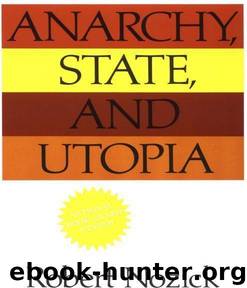Anarchy, State, And Utopia by Robert Nozick

Author:Robert Nozick [Nozick, Robert]
Format: epub
Publisher: Basic Books
Published: 1974-08-31T23:00:00+00:00
b) There is no system S such that SB—Sw < UB - Uw, and
UW SW ≤ (UB—UW) (SB - SW).
(Notice b) comes to: There is no system S with less inequality than U, such that the extra benefits of U over S are less than or equal to its extra costs.)
In increasing order of egalitarian stringency we have: the dif ference principle, the first specification of General Egalitarian Principle 1, the first specification of General Egalitarian Principle 2, and the principle of strict equality (choose E). Surely an egalitarian would find the middle two more attractive than the difference principle. (Such an egalitarian might want to consider what changes in the structure of the Original Position or the nature of the persons in it, would lead to one of these egalitarian principles being chosen. ) I do not myself, of course, suggest that these egalitarian principles are correct. But their consideration helps illuminate exactly how egalitarian the difference principle is, and make it implausible to claim it stands as the most egalitarian plausible principle short of strict equality. (However, perhaps Scanlon means that any more stringent egalitarian principle would have to ascribe a cost to inequality, and no theoretical justification has been given which would enable one to ascribe a precise cost.)
There is one way we should mention whereby even more egalitarian principles might be gotten from Rawls’ original position. Rawls imagines rational self-interested persons behind a veil of ignorance choosing principles to govern their institutions. He further imagines, in the third part of his book, that when raised in a society which embodies these principles, people thereby develop a sense of justice and a particular psychology (attitudes towards others, etc.). Call this Stage I of the argument. Stage II of the argument would involve taking these people who are the result of Stage I and the operation of a society in accordance with Stage I principles, and placing them in an original position. The Stage II original position contains individuals with the psychology and sense of justice which is the product of Stage I, rather than individuals who are (merely) rational and self-interested. Now these persons choose principles to govern the society they are to live in. Will the principles they choose in Stage II be the same principles chosen by the others in Stage I? If not, imagine people raised in a society embodying the Stage II principles, determine what psychology they would develop, and place these individuals, who are the products of Stage II, in a Stage III original position, and continue as before to iterate the process. We shall say that the iterated original position yields particular principles P if 1) there is a Stage n original position wherein P is chosen, and P is also chosen in the Stage n+ 1 original position, or 2) if new principles are chosen in each new stage of the original position, these principles converge to P at the limit. Otherwise, no particular principles are yielded by the iterated original position, e.
Download
This site does not store any files on its server. We only index and link to content provided by other sites. Please contact the content providers to delete copyright contents if any and email us, we'll remove relevant links or contents immediately.
The Secret History by Donna Tartt(19002)
The Social Justice Warrior Handbook by Lisa De Pasquale(12177)
Thirteen Reasons Why by Jay Asher(8874)
This Is How You Lose Her by Junot Diaz(6857)
Weapons of Math Destruction by Cathy O'Neil(6249)
Zero to One by Peter Thiel(5768)
Beartown by Fredrik Backman(5718)
The Myth of the Strong Leader by Archie Brown(5482)
The Fire Next Time by James Baldwin(5409)
How Democracies Die by Steven Levitsky & Daniel Ziblatt(5200)
Promise Me, Dad by Joe Biden(5132)
Stone's Rules by Roger Stone(5065)
A Higher Loyalty: Truth, Lies, and Leadership by James Comey(4939)
100 Deadly Skills by Clint Emerson(4901)
Rise and Kill First by Ronen Bergman(4761)
Secrecy World by Jake Bernstein(4727)
The David Icke Guide to the Global Conspiracy (and how to end it) by David Icke(4685)
The Farm by Tom Rob Smith(4489)
The Doomsday Machine by Daniel Ellsberg(4474)
